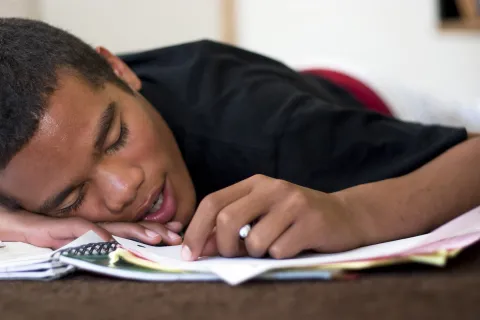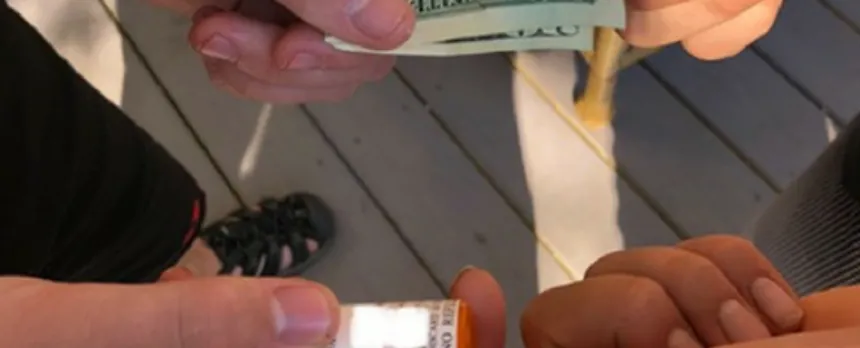Sleep Deprivation in Teens: A Common Problem

Teens on average need about 8.5 to nine hours of sleep at night. But most don't get the amount of sleep they need. School, friends, homework, activities, television, video games, cell phones and the computer may have a higher priority for a teen than sleep. Sleep deprivation can have serious consequences for a teen's health and well-being. What do you need to know?
A Teen's Natural Sleep Rhythms
Teens tend to stay up late and want to sleep late in the morning. This isn't necessarily due to laziness or stubbornness. It's actually due to natural rhythms of the teen's body, explains Ted Kremer, MD, director of pediatric sleep medicine, Children's Medical Center. Body chemicals in teens work to make them naturally want to go to bed after 10 pm and for some teens as late as midnight or later and wake up in the late morning. Early school start times conflict with these natural body rhythms. And pressures on a teen's time after school keep him or her from going to bed early to compensate. The result is often a sleep-deprived teen.
Should I Be Concerned About Sleep Deprivation?
The National Institutes of Health (NIH) reports that teens who don't get enough sleep have trouble focusing in class and often have lower grades than they are capable of achieving. The NIH also has found growing evidence linking a chronic lack of sleep in teens with an increased risk of being overweight, developing diabetes or heart disease, and getting infections. Teens who are sleep deprived may fall asleep in class or other inappropriate places. And for teens who are driving, being sleepy can raise the risk of a serious accident.
Signs That Your Teen Needs More Sleep
Is your teen sleep deprived? Watch for the following signs:
- Daytime sleepiness
- Trouble concentrating or remembering
- Irritability
- Need for caffeine or other stimulants to stay awake
- Need for naps after school
- Falling asleep in school
- Poor grades
- Trouble falling asleep or staying asleep
Encourage Habits to Improve Sleep
According to Dr. Kremer, there are some ways to help your child get more sleep and be more alert during the day:
- Encourage your teen to get a full night's sleep on a regular basis. Try to set a regular bedtime. Help your teen avoid staying up late to do homework or study. If extracurricular activities after school are too time-consuming, consider cutting back.
- Have your teen get up around the same time every morning. Discourage sleeping in late on weekends to "catch up on sleep." This does more harm than good by throwing sleep rhythms off. Avoid going to bed more than one hour later and waking up more than one to two hours later on weekends.
- Limit caffeine intake. Don't let your child have caffeine after lunch.
- Discourage doing anything in bed other than sleeping, such as reading, writing, eating, watching TV, talking on the phone, or playing videos or games.
- Restrict TV and computer use (which can be stimulating) for at least an hour before bedtime. Instead, encourage reading, listening to quiet music, writing in a journal or enjoying other calming activities.
- Try to avoid eating within two to three hours before bed since this may interfere with sleep.
- Make the bedroom conducive to sleep. Remove the TV, computer and phone from the bedroom. Make sure the bedroom is cool and as dark and quiet as possible.
- Open the curtains and turn a bright light on in the child's room in the morning. The bright light helps the body wake up and shuts down production of sleep hormones. Alarm clocks with a light feature are available on the Internet.
- Spend time outdoors during the day getting natural sunlight. Exercise during morning or afternoon hours can also help sleep.
When to See a Doctor
If your child has any of the below symptoms, parents should speak with a doctor. The following can be signs of a more serious problem that can be treated.
- Often falls asleep during the day
- Has leg twitching or moving when trying to fall asleep, or extremely restless sleep
- Sleepwalks often
- Snores loudly
- Has insomnia (trouble falling asleep or staying asleep) often
Note: The content of this blog is for informational purposes only. It is not intended for use as diagnosis or treatment of a health problem or as a substitute for the professional consultation of a physician or qualified health care provider. If you have specific questions or concerns regarding a health or medical condition, contact your physician or a licensed health care professional.




